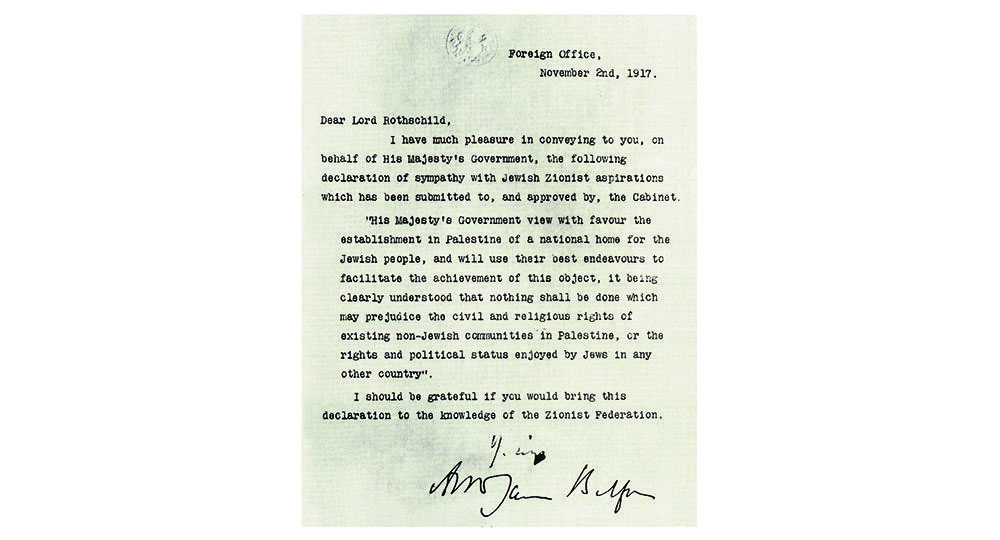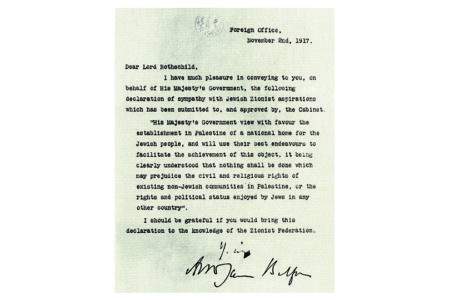Behind the Balfour Declaration
The most prominent events marking the early days of the modern Zionist movement were the publication of Theodor Herzl’s The Jewish State in 1896 and his calling of the First Zionist Congress in 1897. Herzl recognized that if the Zionist dream of a homeland for the Jewish people was to be realized, international approval of the idea had to be secured. He spent the remainder of his short life seeking such approval, but he died in 1904, disappointed at his failure to do so. The “Great War,” now known as World War I, further threatened those dreams. Turkey, Germany’s main ally, had been in control of the Holy Land for nearly 400 years. If international approval for a Jewish homeland was to be secured, it would have to be sought through an Allied victory in the war. The best hope for such an approval lay with Great Britain, whose far-flung empire demonstrated that it was already engaged in the great game of international colonialism.
Before the end of the war, at a time when British hopes were buoyed by their invasion of the Middle East under General Edmund Allenby, the British cabinet issued the famous Balfour Declaration. Arthur James Balfour, Foreign Secretary in the British government, communicated the following memo to Lord Rothschild, head of the Zionist Federation in Great Britain, on November 2, 1917:
I have much pleasure in conveying to you, on behalf of His Majesty’s Government, the following declaration of sympathy with the Jewish Zionist aspirations which has been submitted to, and approved by, the Cabinet.
“His Majesty’s Government view with favour the establishment in Palestine of a national home for the Jewish people, and will use their best endeavours to facilitate the achievement of this object, it being clearly understood that nothing shall be done which may prejudice the civil and religious rights of existing non-Jewish communities in Palestine, or the rights and political status enjoyed by Jews in any other country.”
Finally, after nearly 40 years of building Jewish settlements in the Holy Land and 20 years after the Zionist Congress, international recognition by a major world power for a Jewish homeland had been secured. Much has been written about the political and strategic issues behind the Balfour Declaration. Many reasons have been given for its issuance. The full story, however, may not be given in the standard history books.
What events and circumstances caused the British government to publicly back the Zionist dream of a homeland for the dispersed Hebrews?
The Reasons
In most of the historical accounts of this period, at least three reasons are given for the British decision. While all three played a definite role in shaping British attitudes, a fourth probably was the most decisive.
What are the reasons for the Balfour Declaration?
- The British government had a great desire to maintain an open channel through the Middle East to its extensive possessions in India and East Africa. A Jewish homeland, under British sponsorship, could maintain that freedom of access, which had been cut off by the Ottoman Turkish holdings in the region. Jewish control of Palestine, therefore, was in England’s best interest.
- The British government wanted to keep the Russians in the war and persuade the Americans to enter the war. A decision to favor the Zionist cause would encourage both Russian and American Jews to influence their governments to join with Britain and the Allies in the fight against the Germans and Turks. While this probably overestimated the political power of the Russian and American Jews, it is one of the reasons most often cited.
- The British government wanted to reward the brilliant chemist and Zionist leader, Chaim Weizmann, for his help in the war effort when he developed a process to synthesize acetone, an ingredient necessary for producing the explosives that were in extremely short supply. While Weizman certainly did help the British war effort, this tale, later told by Lloyd George, was largely invented. Weizman never mentioned it in his autobiography, Trial and Error.
Historians debate and wrangle over the degree to which these three factors influenced the British cabinet to issue the Balfour Declaration. However, none of the three, nor all of them together, seem to be sufficient reasons for the positive British view. When we consider the Christian beliefs of the major members of the cabinet, we can conclude that the biblical teaching of Israel’s return to Zion was the main reason that the cabinet was moved to issue the Balfour Declaration.
The Men
Who were the main players in this decision, and what did they believe about Israel in Bible prophecy?
David Lloyd George was the Prime Minister. Unlike many other British lawmakers, Lloyd George was not educated in schools that stressed the Greek and Latin classics, but was brought up on the Bible. He often remarked that the names of biblical places were better known to him than were those of the battles that figured in the war. He was reared in the centuries-old movement in British evangelical thought that stated that the British should take the lead in restoring the Jews to Zion. He was but the latest in a long line of Christian Zionists in Britain that stretched back to the Puritans. Guided by the Scriptures, this “restoration” movement, as it was called, believed that the advent of the Messiah would occur once the Jewish people were restored to their native land. Lloyd George wanted his country to carry out what he regarded as the Lord’s work in the Middle East. His own words about the Balfour Declaration are clear:
It was undoubtedly inspired by natural sympathy, admiration and also by the fact that, as you must remember, we had been trained even more in Hebrew history than in the history of our own country. I could tell you all the kings of Israel. But I doubt whether I could have named half a dozen of the kings of England!
Another member of the cabinet, Jan Christian Smuts from South Africa, earlier had fought the British in the Boer War. Steeped in the Bible, Smuts strongly supported the Zionist ideas. He later wrote in his personal memoirs, “The people of South Africa have been brought up almost entirely on Jewish tradition. The Old Testament has been the very marrow of Dutch culture here in South Africa.” He had been brought up to believe that “the day will come when the words of the prophets will become true, and Israel will return to its own land.”
Arthur James Balfour, influenced by the Scot Presbyterian branch of his family, was also raised on the Bible. His support of Zionism, however, was also based on his sympathy for an oppressed people who had suffered in exile for far too long. Balfour believed that the Jewish genius could be channeled into a productive nation in their original land. When asked why the Jew should be privileged with such an honor, he replied, “The answer is that the position of the Jew is unique. For them race, religion and country are inter-related as they are inter-related in the case of no other religion and no other country on earth.”
Lloyd George, Smuts, and Balfour comprise but a sampling of the many Christian Zionists in British circles who were motivated by biblical concerns. While the political, military, and strategic reasons that led the British cabinet to issue the Balfour Declaration cannot be discounted, it is this last influence that needs to be noticed and stressed. Without this biblical predisposition, the Balfour Declaration would not have been issued. A secular historian concludes, “Biblical prophecy was the first and most enduring of the many motives that led Britons to want to restore the Jews to Zion” (David Fromkin, A Peace to End All Peace, p. 298).
It is amazing to recognize how the Bible has often influenced decisions leading to major historical events. It is also amazing to recognize how Gentile Christians who believe the promises of God’s Word have often been the best friends of the Jewish people. For further evidence of this, consult the newly published book, The Zion Connection, by Elwood McQuaid, Executive Director of The Friends of Israel.








